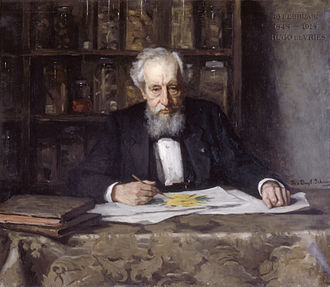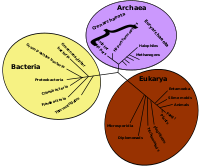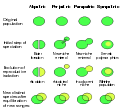Portal:Evolutionary biology
Introduction
Selected article - Mutationism is one of several alternatives to evolution by natural selection that have existed both before and after the publication of Charles Darwin's 1859 book On the Origin of Species. In the theory, mutation was the source of novelty, creating new forms and new species, potentially instantaneously, in sudden jumps. This was envisaged as driving evolution, which was thought to be limited by the supply of mutations. Before Darwin, biologists commonly believed in saltationism, the possibility of large evolutionary jumps, including immediate speciation. For example, in 1822 Étienne Geoffroy Saint-Hilaire argued that species could be formed by sudden transformations, or what would later be called macromutation. Darwin opposed saltation, insisting on gradualism in evolution as geology's uniformitarianism. In 1864, Albert von Kölliker revived Geoffroy's theory. In 1901 the geneticist Hugo de Vries gave the name "mutation" to seemingly new forms that suddenly arose in his experiments on the evening primrose Oenothera lamarckiana. In the first decade of the 20th century, mutationism, or as de Vries named it mutationstheorie, became a rival to Darwinism supported for a while by geneticists including William Bateson, Thomas Hunt Morgan, and Reginald Punnett. (Full article...) General images -The following are images from various evolutionary biology-related articles on Wikipedia.
Selected picture - The hominoids are descendants of a common ancestor. Did you know... -
CategoriesRelated portalsTasks you can do
Related topicsWikiProjectsWikiProjects connected with biology: A complete list of scientific WikiProjects can be found here. See also Wikispecies, a Wikimedia project dedicated to classification of biological species. Associated WikimediaDiscover Wikipedia using portals
|







![Image 6A covalent adduct between the metabolite of benzo[a]pyrene, the major mutagen in tobacco smoke, and DNA (from Mutation)](http://upload.wikimedia.org/wikipedia/commons/thumb/d/d8/Benzopyrene_DNA_adduct_1JDG.png/87px-Benzopyrene_DNA_adduct_1JDG.png)









































